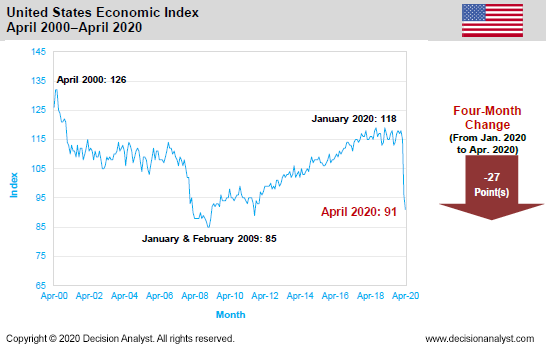U.S. and World Economy Are Entering A Deep Recession
Arlington, Texas—The Decision Analyst U.S. Economic Index fell another 5 points in April 2020, (from the last 10 days of March 2020, when survey data are collected to, the last 10 days of April 2020). From January 2020 to April 2020, the U.S. Economic Index fell 27 points, a meteoric decline. Never in its 20-year history has the Economic Index fallen so far so fast. Below is a 20-year history of the U.S. Economic Index. It shows that the U.S. economy fell off a cliff in the first four months of 2020, and most of that decline came in March and April. There is no doubt that the U.S. economy and the world economy are entering a deep recession.

“As the chart above shows, the U.S. Economic Index has been, on average, relatively flat over the past two years, but it plunged downward in March and April of 2020. The January to April plunge this year is not limited to the U.S. Canada’s Economic Index fell by 12 points (January to April 2020), and Mexico’s Economic Index decreased by 18 points during the same time period. Major European countries also declined. During the January to April 2020 period, Germany declined by 19 points, the U.K. by 18 points, Italy by 19 points, and France and Spain by 9 points each. Russia fell by 16 points, India by 20 points, and Brazil by 24 points,” said Jerry W. Thomas, President/CEO of Decision Analyst.
“If there is a glimmer of hope in the numbers, it’s that the Economic Indices’ declines in April tended to be smaller than the March declines, on average. The second quarter of 2020 is likely to bring a steady stream of bad U.S. and world economic news, as economies contract worldwide. It’s most important that governments all over the world strive to get businesses and organizations open and operating, so long as it’s done carefully and intelligently, to avoid flare-ups of COVID-19. The data suggest that March and April were months of shock, as we (the human race) began to understand the full dangers of COVID-19. But the April data suggest that the negative impacts of COVID-19 on the public’s attitudes were beginning to moderate. Let’s hope this moderation continues, as that could help consumers bounce back quickly as COVID-19 begins (we hope) to abate.” said Thomas.
Methodology
The Decision Analyst Economic Index is based on a monthly online survey of several thousand households balanced by gender, age, and geography. The scientific survey is conducted in the last 10 days of each month. The Economic Index is calculated from 9 different economic measurements using a sophisticated econometric model. The result is a snapshot of coming economic activity in each country surveyed, as seen through the eyes of representative consumers living in the respective countries.
Decision Analyst conducts its concurrent economic surveys each month in Argentina, Brazil, Canada, Chile, Colombia, France, Germany, India, Italy, Mexico, Peru, the Russian Federation, Spain, and the United States. Whenever the Decision Analyst Economic Index is greater than 110, it tends to signal an expanding economy. An Index value of 90 to 110 suggests a no-growth or slow-growth economy, and near or below 90 generally indicates economic contraction. These guidelines vary by country, however.
About Decision Analyst
Decision Analyst (www.decisionanalyst.com) is a global marketing research and analytical consulting firm specializing in strategy research, new product development, advertising testing, and advanced modeling for marketing decision optimization. For over 40 years, the firm has delivered competitive advantage to clients throughout the world in consumer-packaged goods, telecommunications, retail, technology, medical, and automotive industries.
Media Contact
Cristi Allen
Publicity
Email: callen@decisionanalyst.com
Phone: 1-800-ANALYSIS (262-5974) or 1-817-640-6166
Address: 604 Avenue H East
Arlington, TX 76011
Library
Logos & Images
If you are doing a story on Decision Analyst or using any of our published data, news releases or articles, you must cite "Decision Analyst" as the source of the information.
If you use any of the charts or tables from the press releases or other published materials, please email Cristi Allen at callen@decisionanalyst.com to let us know which graphics you took and for what newspaper, magazine, or website it was used.

